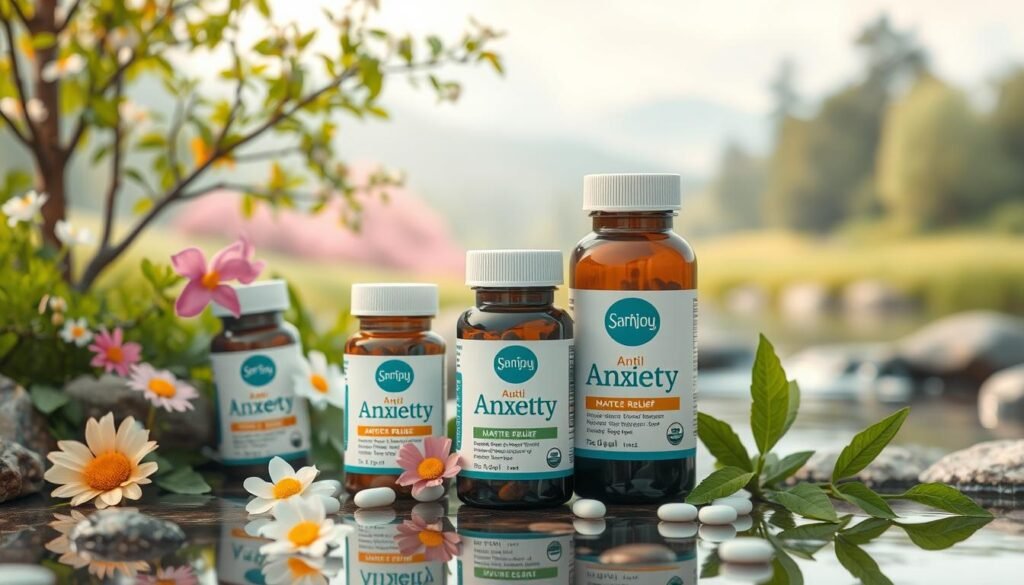Over 40 million adults in the U.S. battle anxiety disorders every year. That’s more than 18% of all Americans. Finding the right anxiety relief medication is essential for many. Anti anxiety drugs help manage symptoms like fast heartbeats and constant worry. They work by easing fear signals in the brain. This lets people feel more normal again.
It’s important to talk with a psychiatrist to get a plan that’s just for you. The success of anti-anxiety medications can differ a lot between individuals. Selective Serotonin Reuptake Inhibitors (SSRIs) and Serotonin-Norepinephrine Reuptake Inhibitors (SNRIs) are often recommended. They’re chosen first because they work well and don’t have harsh side effects. However, benzodiazepines act quickly but may lead to dependency. Knowing about these drugs helps you make smart decisions for your health.
Key Takeaways
- Over 40 million adults in the U.S. experience anxiety disorders annually.
- SSRIs and SNRIs are considered first-line treatments for anxiety.
- Benzodiazepines provide fast relief but carry a risk of dependency.
- Consultation with a psychiatrist is crucial for tailored anxiety treatment.
- About 60% of patients experience significant symptom reduction when combining medication with therapy.
Understanding Anxiety and Its Symptoms
Anxiety is how we naturally respond to stress. But, it can become a big problem when it gets too intense. It causes a range of anxiety symptoms like feeling restless, having a fast heartbeat, feeling tired, struggling to focus, and getting easily annoyed. People often feel anxious in certain situations, such as speaking in public or flying.
About 3.1% of U.S. adults deal with generalized anxiety disorder (GAD) each year. This kind of ongoing worry affects daily living.
Knowing these symptoms helps in finding the right anxiety treatment options. Around 31.1% of U.S. adults will face an anxiety disorder at some time. Last year, about 19.1% of adults had an anxiety disorder. It’s worth noting that these mental health issues start early, with half beginning by age 14. This shows how critical early help can be.
Anxiety disorders often come with other problems. For example, 25% of those with anxiety also deal with depression. The physical side of anxiety, like a racing heart, affects up to 75% of those diagnosed. This makes understanding and handling anxiety even more crucial.
Even though anxiety is common, there are good anxiety treatment options out there. Getting advice from doctors can help people manage their symptoms and find effective treatments. This approach is key to better life quality and making sure people get the right support.
| Anxiety Disorder | Lifetime Prevalence | Symptoms |
|---|---|---|
| Generalized Anxiety Disorder (GAD) | 3.1% | Excessive worry, restlessness |
| Panic Disorder | 2.7% | Panic attacks, rapid heartbeat |
| Social Anxiety Disorder | 12.1% | Intense fear of social situations |
| Specific Phobias | 12.5% | Extreme fear of specific objects or situations |
| Separation Anxiety Disorder | Approx. 4% in children | Excessive fear of separation |
What Are Anti Anxiety Medications?
Anti-anxiety medications help people with anxiety disorders feel better. They improve life quality by changing brain chemicals. These drugs, like antidepressants and benzodiazepines, target anxiety symptoms in various ways.
Benzodiazepines are common for anxiety relief. Drugs like clonazepam (Rivotril), alprazolam (Xanax), and lorazepam (Ativan) are popular. But, they’re mainly for short-term help due to risks of addiction.
Selective serotonin reuptake inhibitors, or SSRIs, are widely used too. They might need 4–8 weeks to work, but some benefits appear earlier. It’s important to follow the prescription closely to avoid problems from long use.
Beta-blockers like metoprolol offer a different route. They treat anxiety’s physical signs without many side effects. This shows the importance of finding a tailored treatment among the many options.
It’s critical to talk with a doctor to find the best anxiety medication. They’ll consider your specific situation and needs.
| Medication Type | Examples | Effects | Usage Duration |
|---|---|---|---|
| Benzodiazepines | Clonazepam, Alprazolam, Lorazepam | Rapid anxiety relief | Short-term |
| SSRIs | Fluoxetine, Sertraline, Escitalopram | Long-term anxiety management | 4–8 weeks |
| Beta-blockers | Metoprolol, Propranolol | Physical symptom reduction | As needed |
| Buspirone | Buspirone | Long-term anxiety management | Daily for 3–4 weeks |
Types of Anti Anxiety Medications
It’s key to know about different anti-anxiety meds. Each type works differently and suits various needs. Let’s dive into the main kinds of anti-anxiety medicine.
Selective Serotonin Reuptake Inhibitors (SSRIs)
SSRIs are top choices for treating anxiety. They’re often used first for general anxiety disorder. By increasing serotonin in the brain, they help reduce anxiety. Popular SSRIs include Zoloft (sertraline), Prozac (fluoxetine), and Lexapro (escitalopram).
They start to work in 2 to 6 weeks. Patients may take them for 6 to 12 months. Side effects can include nausea. The starting dose is usually low and adjusted as needed.
Serotonin-Norepinephrine Reuptake Inhibitors (SNRIs)
SNRIs, like Cymbalta (duloxetine) and Effexor (venlafaxine), are great for anxiety too. They stop serotonin and norepinephrine from being absorbed too quickly. This helps lessen anxiety symptoms. They’re not the best for OCD but are good for chronic pain and anxiety.
Benzodiazepines
Benzodiazepines offer fast relief for severe anxiety. Drugs such as Xanax (alprazolam), Valium (diazepam), and Klonopin (clonazepam) are typical examples. They work well but can cause dependency, so they’re usually for short-term use. The FDA advises careful long-term use.
| Medication Type | Common Medications | Onset of Action | Duration of Treatment | Risks/Side Effects |
|---|---|---|---|---|
| SSRIs | Zoloft, Prozac, Lexapro | 2-6 weeks | 6-12 months | Nausea, weight gain |
| SNRIs | Cymbalta, Effexor | 2-6 weeks | 6-12 months | Fatigue, dizziness |
| Benzodiazepines | Xanax, Valium, Klonopin | 30 minutes – 1 hour | Short-term use recommended | Dependence, withdrawal symptoms |
How Anti Anxiety Medications Work
Anti-anxiety medications improve mood by fixing brain chemical imbalances. They mainly work on neurotransmitters like serotonin and norepinephrine. Drugs like SSRIs and SNRIs raise levels of these chemicals. This action helps enhance mood and decrease anxiety. Such medicines bring lasting changes in brain chemistry, boosting well-being.
Benzodiazepines, however, have a different approach. They boost the GABA neurotransmitter’s calming effects on the brain. These are good for quick relief but are mostly used short-term. They can lead to dependence and have side effects.

Learning about these medicines shows why professional advice is key. These drugs often target anxiety and related issues like depression. Medicines such as Duloxetine and Venlafaxine are common for disorders like GAD.
| Medication Type | Mechanism of Action | Common Side Effects | Use Case |
|---|---|---|---|
| SSRIs | Increased serotonin levels | Dizziness, nausea, drowsiness | Long-term anxiety disorders |
| SNRIs | Increased serotonin and norepinephrine levels | Dizziness, weight gain, increased anxiety | Chronic anxiety disorders |
| Benzodiazepines | Enhances GABA effect | Confusion, headaches | Short-term anxiety relief |
| Beta Blockers | Blocks adrenaline effects | Headaches, fatigue | Situational anxiety |
| Buspirone | Serotonin receptor agonist | Nausea, dizziness | Supplementary treatment for anxiety |
| TCAs | Inhibit reuptake of neurotransmitters | Dry mouth, drowsiness | Alternative when SSRIs fail |
The right anxiety medication depends on the person’s unique needs and a doctor’s guidance. Choosing the best one can greatly affect someone’s mental health path. Knowing how these drugs work makes us value their role in treating mental health fully.
Best Anti Anxiety Medications on the Market
Knowing the best anti-anxiety drugs is key for managing anxiety. There are different medications to pick from based on what you need, your medical history, and your anxiety type. Doctors often review these medications to help choose the right one.
Top Prescription Anti-Anxiety Pills
Some top anxiolytics prescribed are:
- Selective Serotonin Reuptake Inhibitors (SSRIs): Medications like Zoloft and Lexapro are chosen often. They are safe and work well for treating anxiety over time.
- Serotonin-Norepinephrine Reuptake Inhibitors (SNRIs): Drugs like Cymbalta and Effexor XR are great choices. They help by increasing serotonin and norepinephrine, improving mood and anxiety.
- Benzodiazepines: Options such as Xanax and Klonopin offer quick anxiety relief. But, they have a dependence risk, making them less ideal for long use.
Comparative Effectiveness of Medications
It’s crucial to understand how well anxiety medications work. Comparing popular medications shows their best uses:
| Medication Type | Common Medications | Typical Dosage | Effectiveness |
|---|---|---|---|
| SSRIs | Zoloft (sertraline), Lexapro (escitalopram) | 20-200 mg (Zoloft), 5-20 mg (Lexapro) | Good for long-term use |
| SNRIs | Cymbalta (duloxetine), Effexor XR (venlafaxine) | 30-60 mg (Cymbalta), 75-375 mg (Effexor) | Works for anxiety and depression |
| Benzodiazepines | Xanax (alprazolam), Klonopin (clonazepam) | 0.25-4 mg (Xanax), 1-2 mg (Klonopin) | Fast relief, but has risks |
Potential Side Effects of Anti Anxiety Medications
Anti-anxiety medications can offer relief from anxiety. But knowing about potential side effects is key. Medicines like benzodiazepines can cause drowsiness and memory issues. They might lead to addiction, mental problems, and higher risk of injury in older adults. The American Academy of Family Physicians says these drugs can lose their effect after 4 to 6 months.
SSRIs and SNRIs have their own anti-anxiety medication side effects. SSRIs can lead to nausea, tiredness, and issues with sexual function. Some studies show SSRIs might not work better than a placebo. This shows the need to watch how these drugs affect people closely.
Stopping antidepressants suddenly can bring on withdrawal. This can make you feel very down and irritable. SNRIs can cause your blood pressure to go up and make you dizzy. It’s important to talk with doctors about these risks to find the best treatment.
- Benzodiazepines: Risk of dependency, confusion, memory problems, and blurred vision.
- SSRIs: Possible nausea, fatigue, sexual dysfunction, and withdrawal symptoms.
- SNRIs: Increased blood pressure and dizziness may occur.
For more info on common side effects of anxiety meds, look at trusted sources. It’s vital to tell your doctor about all medicines you take to avoid bad interactions.

| Medication Type | Common Side Effects | Recommended Duration of Use |
|---|---|---|
| Benzodiazepines | Drowsiness, cognitive impairments, risk of addiction | Less than 1 month |
| SSRIs | Nausea, sexual dysfunction, fatigue | 6 to 12 months |
| SNRIs | Dizziness, increased blood pressure | 6 to 12 months |
Considerations for Taking Anxiety Medication
When looking into treatment for anxiety, it’s important to know who should prescribe the medicine. Licensed healthcare providers, especially psychiatrists, have the right skills to check each case. They can suggest the best treatment and handle any side effects. Talking openly with a healthcare professional is key to finding the right medicine safely.
Who Should Prescribe Anxiety Medications?
Psychiatrists and other experts usually prescribe anxiety medications. They look into the mental health needs of each person and make a treatment plan just for them. Working together with your healthcare provider makes sure the medicine fits your needs. By looking into anxiety medication reviews, you can play a big part in your treatment.
Factors Influencing Medication Choice
Choosing the right medication involves a few key factors. Here’s what to consider:
- The type of anxiety disorder, like generalized anxiety disorder
- Your medical history and any other medicines you’re taking
- How you feel about side effects and how long to treat
- Being open to therapy, like cognitive behavioral therapy, which helps a lot with anxiety
Keeping track of your treatment’s progress is very important. Having regular check-ups helps in improving symptoms and sticking with the plan. Also, trying other methods like lifestyle changes or support groups could enhance your medication’s effect. This all-around approach is crucial for effectively managing anxiety.
Managing Anxiety with Medication
Managing anxiety often means using different methods, including medication. About 31.1% of U.S. adults will face anxiety disorders at some point. Yet, only 36.9% of those get help. This shows why it’s key to look into the treatments available.
Choosing the right medication is very important. Anti-anxiety meds, such as benzodiazepines and buspirone, help many people. Benzodiazepines work fast but might lead to dependency in 10-30% of users. Buspirone takes 2 to 6 weeks to start working, which may be hard for those wanting quick help.

Medication should be part of a larger plan. Research shows 60-80% of people do well with Cognitive Behavioral Therapy (CBT) plus medication. Adding exercise can reduce anxiety by 20-30%. This whole approach can make anxiety easier to handle.
There are also herbal remedies and dietary supplements. But, they’re not well-regulated so their quality and effectiveness can vary. It’s important to talk with healthcare providers to find what works best for you.
| Medication | Time to Effect | Dependency Risk | Commonly Used With |
|---|---|---|---|
| Benzodiazepines | Immediate | 10-30% | CBT, lifestyle changes |
| Buspirone | 2-6 weeks | Low | CBT |
In summary, dealing with anxiety through medication requires looking at all options and working closely with doctors. A plan that includes lifestyle changes along with meds can really improve mental health.
Alternative Treatments for Anxiety Relief
Anxiety doesn’t only have to be treated with meds. There’s a holistic side, too. Cognitive Behavioral Therapy (CBT) is a key method. It changes negative thoughts which helps manage anxiety without drugs. Many people find CBT really helpful in their lives.
Making changes to your lifestyle is important for controlling anxiety. Exercise is great because it fights anxiety. Just 5 minutes of running or dancing can make a difference. Eating right and drinking 6 to 8 glasses of water a day also helps reduce stress.
| Herb | Effectiveness | Comments |
|---|---|---|
| Kava | High effectiveness reported | FDA warnings for potential liver damage. |
| Passion Flower | Limited effectiveness | Some side effects like sleepiness, dizziness. |
| Valerian | Mixed results | Varied responses; some find relief, others do not. |
| Chamomile | Safe for short-term use | Bleeding risk with blood thinners; allergic reactions noted. |
| Lemon Balm | Promising results | May reduce worry and excitability; studies ongoing. |
| Lavender | Some evidence suggests benefits | Side effects like constipation and upset stomach. |
There are many non-traditional treatments for anxiety. But, it’s key to be careful. Herbal supplements aren’t checked by the FDA like other medicines. So, their quality can vary. Always talk to a doctor before starting new treatments. Looking at all your options can create a full plan for easing anxiety.
Conclusion
Anti-anxiety medications play a vital role in reducing anxiety symptoms. But, finding long-term relief is tough. Research shows that a significant number of patients do not get better with modern drugs.
It’s essential to understand how these meds work, like SSRIs and SNRIs. They help by increasing certain chemicals in the brain. Side effects happen, but they are often mild. It’s crucial to think about the pros and cons of these meds.
About 20% of people on these medications need more time to see improvements. This highlights the importance of sticking with treatment. It also shows why we must address negative thoughts about taking medication.
When used alongside therapy, these meds can greatly improve life for those with anxiety. Working closely with healthcare providers is key. Together, they aim for better mental health and less anxiety.